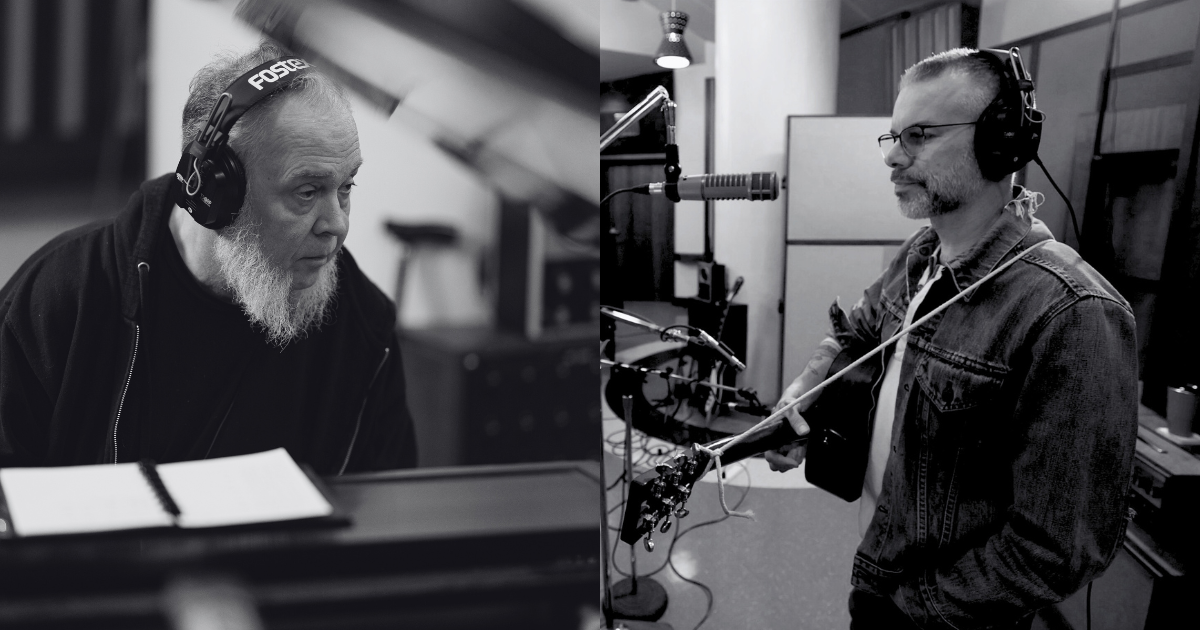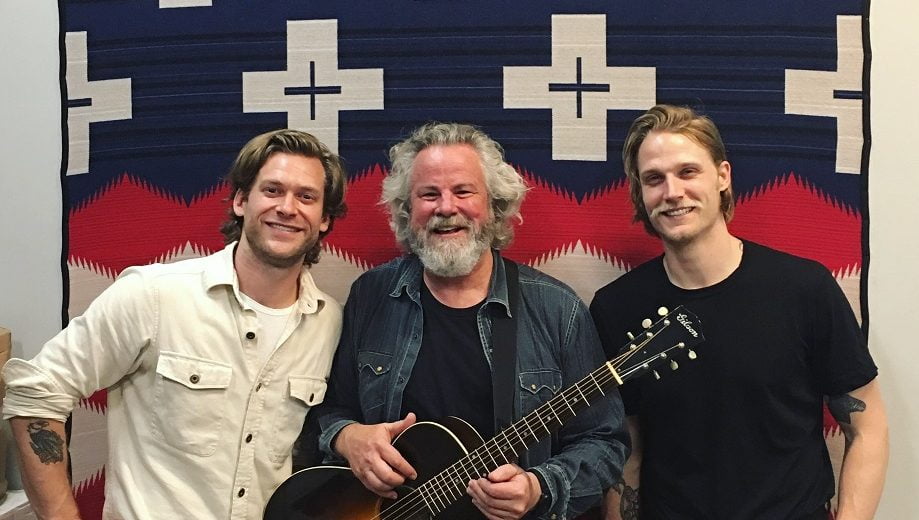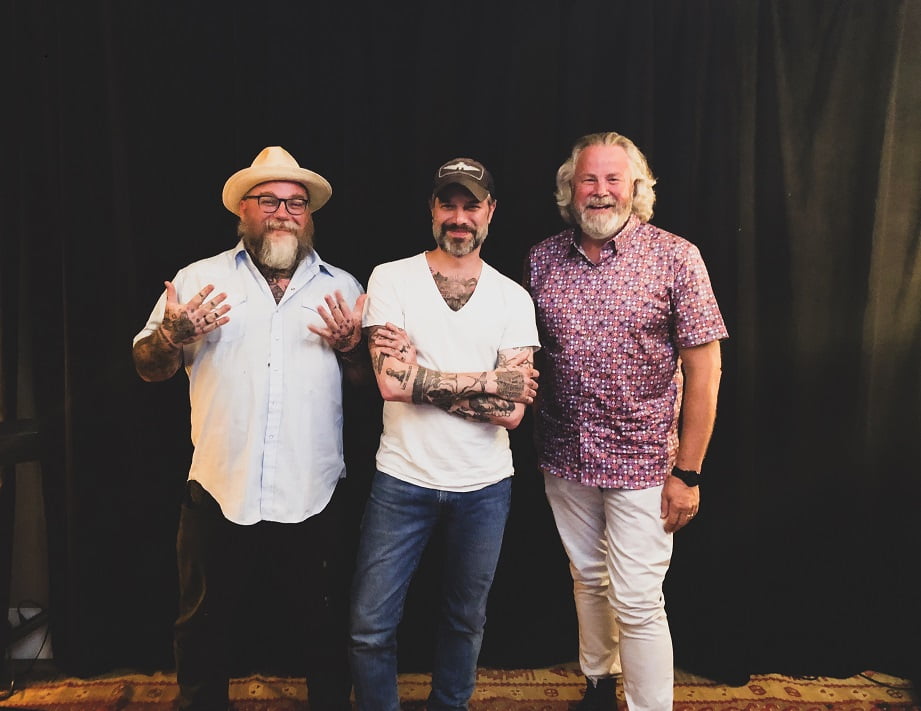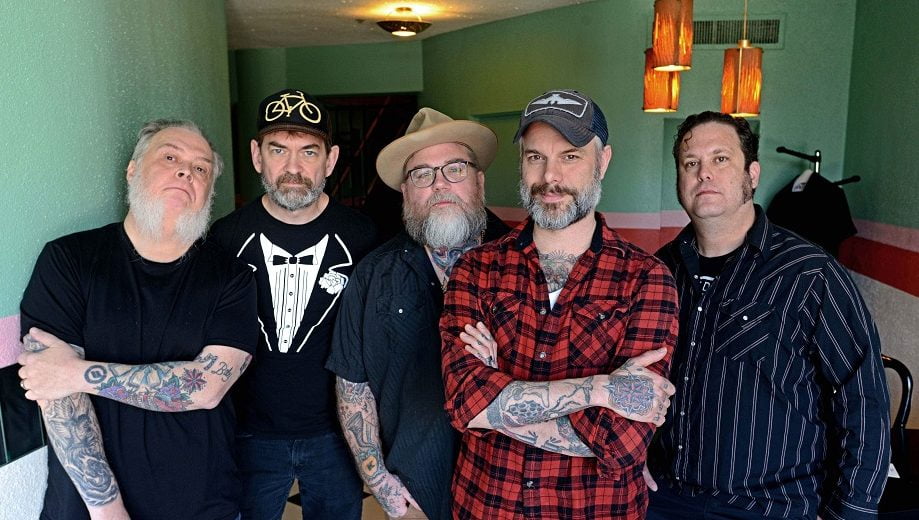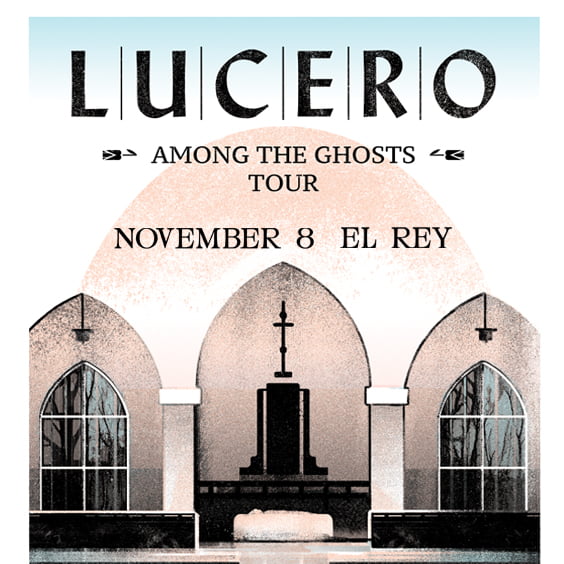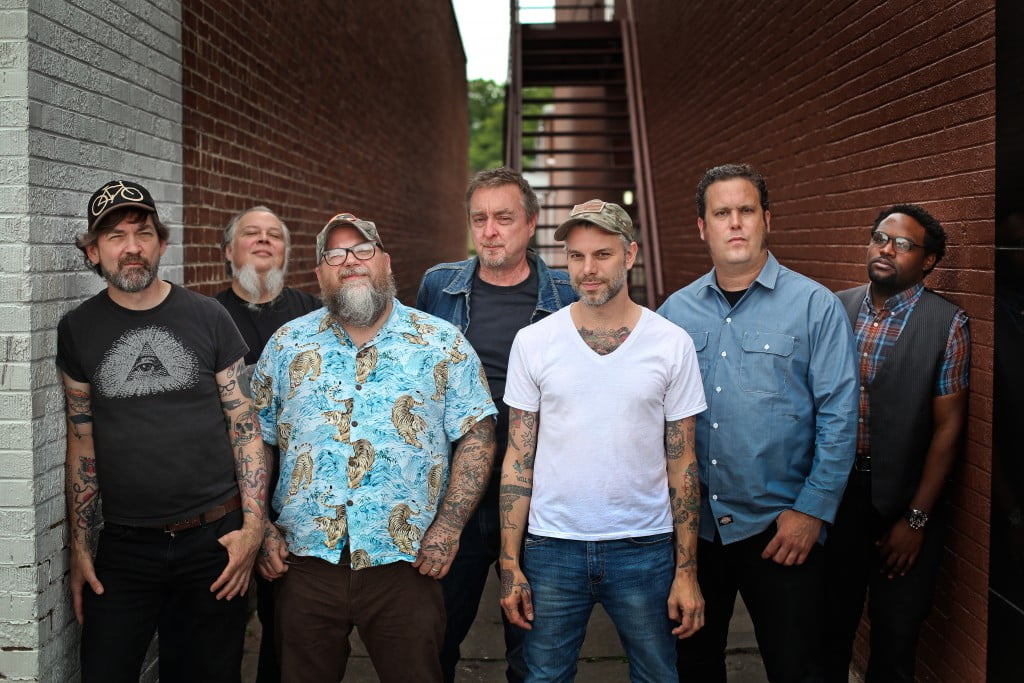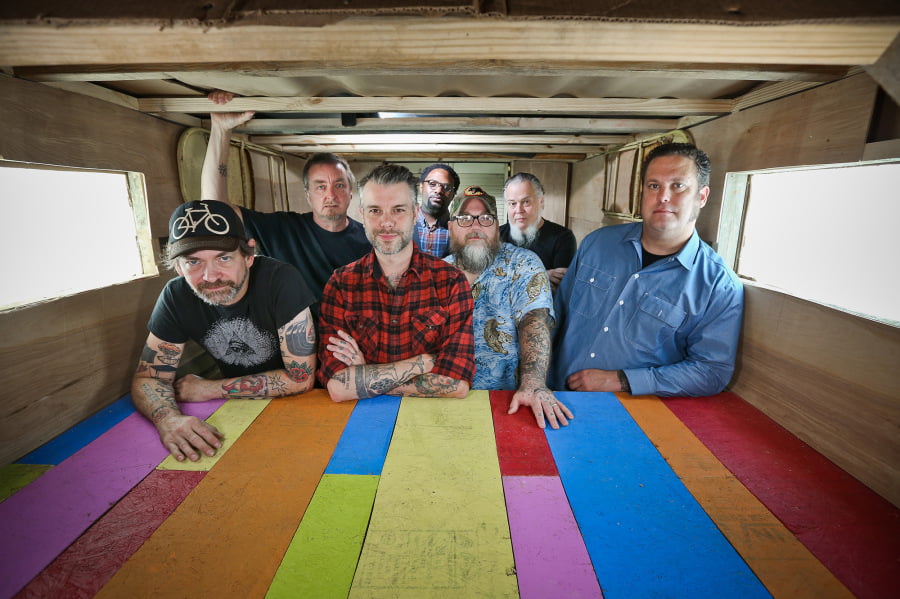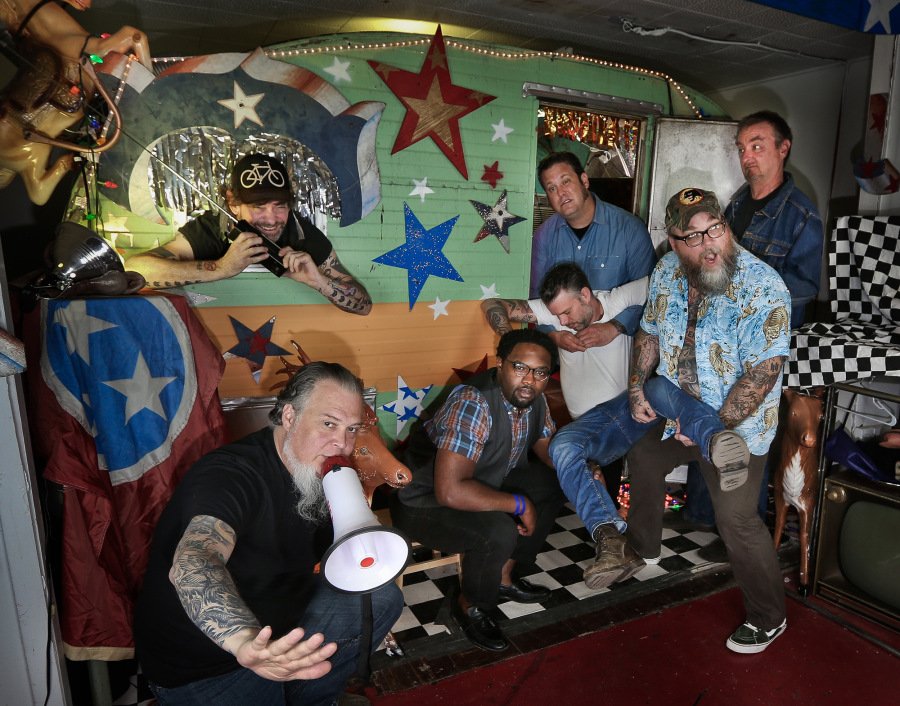Lucero is one of those bands that has been around so long, pretty much everyone's been a fan at one point or another. And, if not, the new album might just change that. With its acoustic underpinnings, All a Man Should Do is the country-rock outfit's most mellow offering to date … though it still kicks plenty of ass. For this set, frontman Ben Nichols had a lot to work through, not to mention a record he'd always wanted to make. So the gang packed into Ardent Studios in their hometown of Memphis, TN, and got down to business. That's guitarist Brian Venable's story, anyway … and he's sticking to it.
How's Milwaukee on this fine morning?
Brian Venable: Ahhh, let's just see. It is bright. Scott is not wearing a jacket, so it might not be too cold. And … that's about it. That's all I got. It looks like Milwaukee.
You're going into day three of five shows in a row. Man, if you're being held against your will, clear your throat or sneeze and I'll send some help.
Ha. I do have the sniffles, but it ain't nothing. We had two days off two days ago … three days … I don't know.
See? [Laughs]
But we've had some time off. [Laughs] And we're making up for it. In the old days, we would've left on October 1 and not come home until December 19. Now, it's two more shows and then we're off for a week-and-a-half, and then we do the West Coast. We have to pack them in a little bit knowing that we get to go home and actually be home for a little while.
Well, let's talk about home. Let's talk about Memphis. Obviously, it has a deep, rich musical history, but tell me about the scene that you guys came up in.
Memphis has always … I mean, it's Memphis. You love it. We're self-sabotaging, dirty, amazing people. We've got a chip on our shoulder. Nashville always thinks they're better than us and we always think we're better than Little Rock. It just trickles down.
But we all came out of different … we're punk-rock kids, to some degree. Ben grew up in Little Rock, so I think that's where we might've gotten our work ethic — a “We should do this, but we don't know how to do this, but that's not going to stop us” kind of thing.
There are always bands in Memphis. There's always going to be a local scene, whether you're part of it or not. Some days, I feel real old because I don't go out as much. We'd play shows pretty much by ourselves and then, at some point, you make friends and somebody's like, “Oh, come play a show with us!” Then, all of a sudden, it's Lucynell Crater, Lucero, Bicycle Thief, somebody else … every freaking weekend. Then, slowly but surely, you start opening for the big bands that come through. I think, in our world, the North Mississippi All-Stars were the first ones to make it out and they took us out opening for them way before we were ready … which was awesome. There's just always some sort of music going on and those bands maybe also put out a CD or a 7-inch and then break up six months or a year later and don't ever play again. Some of the best bands you've never seen in your life have been together, broken up, and moved on, and you're just like, “Man! What happened?!”
Just that moment in time.
Well, that's the thing … we're too dumb to quit. But we set ourselves up. “Dare to be great” sounds amazing, but it's more like “Paint ourselves in a corner” with the whole “Don't have real jobs. Move into one place and live together and buy a van you have to pay the note on.” I mean, we have to do this. A lot of people are like, “Nah. I'm going to be a graphic designer.” Or, “I'm going to go back to … whatever.” We don't really have anything to go back to.

Yeah, yeah. To me, the thing that makes Memphis — and the sound that comes out of there — special is somewhere between Sun, Hi, and Stax in a beautiful collision of Southern rock, soul, country, and blues.
Because we're all surrounded by it. I walked past Ardent [Studios] for four years before I knew what it was. It's that kind of stuff. I used to watch Alex Chilton wash dishes at Avalon Café because he didn't have money to pay for his food. I didn't really put it together, at the time. I was 15 or 16. You're surrounded by all of that and you throw in your Grifters, your Goner Records, your Oblivians — which is, basically, blues stripped down to its essence.
It's also hidden. We were able to play shows for almost two years to, literally, nobody — not necessarily no crowds, but no outside influence. Nobody told me not to play over Ben while he sang. Nobody told us about song structure or that we needed bridges. We made our own and that's part of the beauty of Memphis — you get to incubate longer and you can draw on all these crazy things. You can be like, “Man, I just heard this crazy something the other day.” And you can bring it in without anybody saying, “No. We only play country.”
I was a punk-rock kid who got fascinated with Lynyrd Skynyrd and worked my way back to “T Is for Texas.” And you find Jimmie Rodgers. Then you find the Carter Family. You take a curve and that leads you down to … I worked at Last Chance Records and some old dude had to sell his entire bluegrass record collection so I got swamped into that. You just find things and pull from it because there's not a scene, necessarily, that is so musically strict. You want to start a dance band, you start a dance band. But, if you play in a rock 'n' roll band and want to have a dance song, you write a dance song.
So, which of those things — if it's possible to pinpoint any — which of those varied influences would you say are informing this new record. It's definitely different than records past.
It's not necessarily a joke, because Ben has said it in press releases and interviews … it's that record we all wanted to make … for me, it was maybe before I discovered punk rock, when you're like, “Oh, the Smithereens, the Violent Femmes …” And somebody says, “If you like that, you should listen to this.” And there's that small window, for me anyway and a bigger one for Ben, where it was the Stone Roses and the jangly … I like to say we're a paisley shirt and a bolo tie away from being the Smithereens on this record. [Laughs]
[Laughs] You really are.
Cory Branan heard the record before it was out and said, “Man, that record sounds like it was made by a band with nothing to prove.” And I was like, “Is that a bad thing or a good thing?” [Laughs] But, really, it is. At this point, every record we put out is going to be “the big record.” We've been hearing that since the first record. After a while, we just make records we want to make.
Ben had some good life experience that was poured into the lyrics. It's a stronger record, lyrically, than the last few have been, to me. Not that they're bad, but this one definitely had a direction before it had a direction. And we'd done that stripped-down Texas and Tennessee EP and that kind of lit us. You can only get so loud in R&B and loud, solo-y Southern rock before you need to bring it back. I think that's part of it.
When we say “the old sound,” for me it's learning those country bends or learning a new soul-shaped chord structure and being able to actually introduce it. For him, it's being able to play acoustic and have that feel. We're older and, if you step back from it, our whole discography is a very dynamic one. It starts out quiet, crescendo, bring it back … Who knows? It might be quiet for the next two records and then we make a metal record or whatever. [Laughs]
[Laughs] You had a quote I love where you were talking about the different fans you can bring along: “I think our music is always open to so many different people that you can actually discover us as a 14-year-old Against Me! fan, that turns into a 25-year-old Wilco fan, that turns into a 45-year-old Kris Kristofferson fan.” I like it when I see bands aging gracefully, but still rocking …
Man. Will you write that down and send it to my manager — that we're aging gracefully? [Laughs] That's a third-party actual quote.
[Laughs] Will do. It seems, like you were saying, if your sound evolves with your life and maybe mellows a bit in pace with you and your fans, that's just good for job security, right?
I mean, we're the hardest-working, best-kept secret in the music industry, is what I like to think. We're still everybody's favorite band. We are not the popular band. And there's nothing wrong with that. We make a living. We have fun. We get to make the art we want to make. Nobody's telling us to change. But it's definitely something … we can be 80 years old, sitting on stools on stage and still making music.
But it's also hard to sell when you're … this is other people telling us this and it tickles me: “That range is great, but …” They can't put us in a box, going from the 14-year-olds to the 50-year-olds. Are we country? Are we bluegrass? “Oh, they're punk-rock kids.” “Oh, but we're going to put them on this country show.” But that, to me, does mean we'll last longer, because we don't get pigeon-holed, blow up, turn into a one-record wonder, and fizzle away. I like being that edgy, kind of tense, always hungry. We make fun records that we like to make. And we're very lucky that people want to hear them still. But it is an interesting dynamic … until we start getting drunk and fighting each other.
The beauty of that more mellow stuff is that you pick up pansies like me who love good acoustic rock more than the punkier stuff. So, I'm going to agree with Salon — I think this may be your best record yet.
Man, we were terrified to put this record out. We were just like, “Oh, we're about to make everybody mad.” People we thought would truly hate it were like, “It's like the old stuff!” And, we're going to let them say that, but it's nothing like the old stuff. “If you feel that way and you're not talking bad about it …”
When1372 came out with the horns, you'd have thought we were killing babies on stage. They were just like, “What is this shit?! Horns?! Rock 'n' roll doesn't have horns!” What are you talking about? Lynyrd Skynyrd. Listen to the studio records. Alice Cooper. It's ridiculous. Bill Haley & His Comets. We had the same thing when we put Rick [Steff] on the piano, a lot of people were like, “Whoa!” Nobody wants you to mess with their original formula and everybody's original formula comes on a different timeline in our career.
So we put it out and were like, “Alright. Get ready for some amazingly bad reviews.” Then everybody started liking it and it was, “Alright! I like this.”

Well, a lot of people talk these days about streaming and playlists being the thing. That's going to serve you guys really well because you can be on a lot of different playlists, right? So there's an upside here.
Yeah, and that's the thing … we don't argue about the track listing anymore because, in the end, they're going to buy the CD maybe. But most people are going to buy it off iTunes or whatever and they'll pull the four songs they like the most. At this point, it's almost a singles club. You could almost put out a new song every day for 12 days and let people put their own order into it and it would be no different.
Us doing 10 songs … just because you can put 20,000 songs on a CD doesn't mean you should. We like the days when it was five songs on each side, if you're lucky, of a record. That seemed to make more of an impact. It's interesting. We've gone through a couple of crazy shifts in the music industry and seem to have weathered them. We got the rock songs on this one for the people that want the country-rock. We got the acoustic rock. We cover all the borders …
Except the Southern metal that I know you love.
Aw, man! Phew! How'd you know that? [Laughs] That's my dirty secret! It's not a dirty secret … it's glorious! When [Jonathan] Athon from Black Tusk passed away, we were almost … it never came about, but we were going to do a Lucero version of a Black Tusk song, all kind of quiet. And, in the middle of it, I was going to get to holler and scream. And we were going to get as metal as humanly possible, then bring it back down and sneak it in. But, yeah … whew … I wish we could make one.
We've been doing “Noon as Dark as Midnight” because A$AP Rocky sampled it for that one song [“Holy Ghost”], so we've been trying to capitalize on that. But it affords me a five-minute guitar wank/freak out which, at this age, seems excessive. I get to use all 12 notes repeatedly. So that's kind of fun.
You busted me out just then. That's pretty funny.
Well, that's all I have. I won't divulge anything else. I'll keep the rest for next time.
Alright.
Photos courtesy of Lucero
